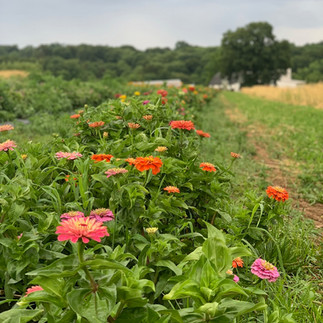Farm Stores Provide Fresh Produce and Community
- Hilary Daninhirsch
- Apr 30
- 5 min read

With warmer weather approaching, fresh fruits and vegetables will soon be in abundance. Many people prefer to buy their produce directly from local farms and farm stores, benefiting both the consumer and the farmer.
Shenot Farm & Market
One of the oldest farms in the northern suburbs is Shenot Farm & Market, established in Wexford in the 1850s. Leah Shenot explained that her husband is a sixth-generation farmer working on the original land settled a century and a half ago.
Shenot said the farm grows about 20 different vegetables—representing 50 to 60 varieties—as well as fruits like blueberries, peaches, and apples. Their farm store operates part-time in the winter but returns to daily hours after the annual Easter egg event.
“We are open year-round, and it’s important for people to understand that because it helps us stay open all year. When you support us outside of the growing season, you’re still contributing to the local economy and community, ensuring that we stay around,” Shenot said.
Shenot’s also sells other local goods. “We have a private label with jams, jellies, and salad dressings, but for the rest of our products, I’ve switched to solely local companies or small businesses in Pennsylvania—I use a co-op for things like that,” she said.
According to Shenot, the North Hills region is unusual for the number of long-established local farms still in existence. Rather than competing, the farms support one another and work together.
Harvest Valley Farms
Established in 1992 by the King family, Harvest Valley Farms cultivates 160 acres of vegetables. According to farmer Art King, “...we grow every kind of vegetable you can imagine. Our seed order is four pages long. We particularly love tomatoes—we grow 21 different varieties. We also grow 12 different varieties of peppers.”
Harvest Valley Farms is also known for Pennsylvania Simply Sweet onions—the only trademarked vegetable crop in Pennsylvania—and their green beans are extremely popular with customers.
In addition to offering a CSA, Harvest Valley Farms operates a market in Bakerstown. As of April, the market is moving to a much larger location just down the road from its former site—the former Bakerstown Feed and Garden Center.
“We have so many locally produced items in our store. We carry a full line of frozen meats from Toma Market in Saxonburg, local coffee, local pierogies, local eggs—including pastured eggs—and milk from two different dairies. The list of local products goes on and on,” said King.
One reason customers flock to Harvest Valley Farms’ market is its full bakery, which features 12 varieties of fresh fruit pies, six kinds of bread, sweetbreads, and more. With the new space, the market will also begin offering deli items, such as lunch meats, cheeses, and sandwiches.

Our Neighborhood Farmstead
During the pandemic, Christa Meeder and her husband began growing food and sharing it with neighbors, setting up an unofficial shop at the end of their driveway.
“Everybody was so appreciative, so we started growing more and learning new concepts. We made friends with other growers and farmers, expanding our network. We converted a horse trailer and started carrying their products on our rolling market—things like honey and jams. We couldn’t keep up with demand on our own, so we started acquiring more items from our farmer friends,” she said.
Eventually, they moved to a tent stand in Duncan Manor Plaza. A fortuitous wrong turn led Meeder to discover a greenhouse for rent, inspiring her to move into a brick-and-mortar location in Franklin Park on Reis Run Road. Formerly the Hartman Farm, the business is now Our Neighborhood Farmstead. Open year-round, the store primarily stocks locally grown produce and products. Meeder has since opened a second, smaller location in Fox Chapel, called The Corner Market.
Depending on the season, Our Neighborhood Farmstead carries everything from flowers and annuals to produce, pumpkins, cornstalks, gourds, corn, mustards, jellies, chocolates, soaps, and relishes. Tomatoes are among her most popular items.
Decorated with old apple-picking ladders, tin baking trays, and vintage Edison lightbulbs, Meeder said, “It looks like you’re walking into a Hallmark movie.”
Freedom Farms
Located on roughly 200 acres in Butler, Freedom Farms is a fifth-generation livestock and produce farm.
“We grow a wide variety of produce and many different varieties of each type. Our favorites are asparagus, sweet corn, onions, lettuce, and tomatoes,” said Tim King, the farm’s co-founder.
In addition to a CSA, Freedom Farms operates two traveling markets in Bloomfield and Aspinwall, as well as a farm market on Route 8.
“We sell many other items at all locations, either made in-house or locally sourced. Some of our most popular products include honey, jams, scratch-made pies, and fresh flower bundles. We also have a farm-to-fork kitchen paired with local craft beer from Grist House Brewing,” said King.
Although some markets operate seasonally, Freedom Farms remains open year-round, even harvesting some produce in their greenhouses during the off-season.
The Advantages of Shopping at a Farm Store
Farmers emphasize the advantages of buying local rather than purchasing from big-box stores.
First, there is a misconception that farm-fresh produce is more expensive, but the opposite is often true. By eliminating the middleman, costs are reduced overall.
Second, farm store produce is fresher since it doesn’t travel hundreds of miles before reaching customers.
“You can take our lettuce home and keep it in your fridge for two weeks. Meanwhile, lettuce from California has traveled 1,300 miles and could already be a week old before it even reaches the store,” Art King explained. “At a farm store, you’re buying directly from the guy who grew it. It’s a win-win.”
Most importantly, supporting local farmers strengthens the community and economy.
“Unfortunately, we’ve become a society of convenience, creating a disconnect between growers and consumers. Many people don’t realize the difference between fresh, nutrient-dense food and food produced for shelf life. We’ve made a great effort to reconnect with our community through events and social media to bridge this gap,” said Tim King.
“There are many benefits to eating in season and shopping locally, but most importantly, it nourishes people and stimulates the local economy. If you know your farmer, you know your food—and we are what we eat,” he added.
What separates a farm store from a grocery store, Meeder noted, is the sense of community.
“I’ll never be as busy as a grocery store, but it’s the personalities and friendliness of the people who work here that make the difference. We’re going to know your name. ONF is a neighborhood.”
Shenot agreed that familiarity is why customers choose farm stores over grocery chains.
“People like knowing their money stays in the community. They feel connected to a small business that’s family-owned and operated right in their neighborhood.”









































The Kroger Co (Kroger) is an in-store and online grocery retailer that specializes in the production and distribution of food and non-food products. Kroger wants to actively listen to customers as they express their complaints or concerns. So KrogerFeedback is medium to understand how satisfied customers their customer are with store cleanliness, product availability, staff behavior and checkout efficiency.https://www-krogerfeedback.com/